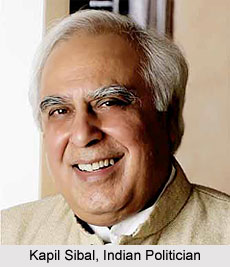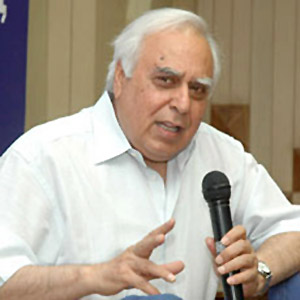 Kapil Sibal, a popular figure among Indian politicians, is the member of 14th Lok Sabha. He was appointed as the Minister of Science and Technology and Earth science. This eminent persona and brilliant student was selected for the Indian Administrative Service. In 1972 he was appointed as the Senior Advocate in the Bar Association.
Kapil Sibal, a popular figure among Indian politicians, is the member of 14th Lok Sabha. He was appointed as the Minister of Science and Technology and Earth science. This eminent persona and brilliant student was selected for the Indian Administrative Service. In 1972 he was appointed as the Senior Advocate in the Bar Association.
Early Life of Kapil Sibal
Shri Kapil Sibal was born on 8th August 1948 to Shri Hira Lal Sibal and Smt. Kailash Rani Sibal at Jalandhar (Punjab). His father, Shri H.L. Sibal, a renowned advocate, was rendered homeless along with his entire family during partition and started his life afresh. Kapil Sibal did his M.A. in History from St. Stephen`s College, University of Delhi, Delhi and LL.M. from Harvard Law School, USA.
Political Career of Kapil Sibal
Kapil Sibal has been the Additional Solicitor General of India from Dec.1989 to Dec.1990. He has been chosen as the Member of Rajya Sabha during 1998-2004. From 2000 to 2002 he has been the Secretary of Congress Parliamentary Party. Kapil Sibal has also been the member of Joint Parliamentary Committee (J.P.C.) on Stock Market Scam from April 2001 to December. 2002, the member of Business Advisory Committee on August 2001, the member of Committee on Home Affairs (2002), elected to 14th Lok Sabha (2004), Union Minister of State (Independent Charge) and lastly Science and Technology and Department of Ocean Development.
Important Posts Held by Kapil Sibal
 During 1995-96, 1997-98 and 2001-2002, Kapil Sibal held the post of President of Supreme Court Bar Association. He was Co-Chairman in Indo-US Parliamentary Forum, 2002. After that he went to the United States to study. In 1991, he became the leader of Indian delegation to the Human Rights Commission, Geneva. He has also been served as the Member of (i) Press Council of India during March 2001 and 2003, (ii) Executive Council, Institute of Constitutional and Parliamentary Studies, July 2001; (iii) Board of International AIDS Vaccine Initiative, headquartered in U.S., 2002; (iv) Programme Board of the Bill and Melinda Gates Foundations India AIDS Initiative, 2003; (v) working group on Arbitrary Detention set up by the Human Rights Commission, Geneva; (vi) Board of Management, Indira Gandhi National Open University, 1993; (vii) Governing Body, St. Stephen?s College, University of Delhi, 1993; (viii) Indian Parliamentary delegation which visited South Africa, Nigeria and Senegal to advocate against Pakistan?s involvement in cross-border terrorism, 2002.
During 1995-96, 1997-98 and 2001-2002, Kapil Sibal held the post of President of Supreme Court Bar Association. He was Co-Chairman in Indo-US Parliamentary Forum, 2002. After that he went to the United States to study. In 1991, he became the leader of Indian delegation to the Human Rights Commission, Geneva. He has also been served as the Member of (i) Press Council of India during March 2001 and 2003, (ii) Executive Council, Institute of Constitutional and Parliamentary Studies, July 2001; (iii) Board of International AIDS Vaccine Initiative, headquartered in U.S., 2002; (iv) Programme Board of the Bill and Melinda Gates Foundations India AIDS Initiative, 2003; (v) working group on Arbitrary Detention set up by the Human Rights Commission, Geneva; (vi) Board of Management, Indira Gandhi National Open University, 1993; (vii) Governing Body, St. Stephen?s College, University of Delhi, 1993; (viii) Indian Parliamentary delegation which visited South Africa, Nigeria and Senegal to advocate against Pakistan?s involvement in cross-border terrorism, 2002.
Kapil Sibal has the honour to address the Indian Parliament in the historic formal document charging a public official with misconduct in office proceedings against Justice V. Ramaswamy who was then a sitting judge of the Supreme Court of India. Kapil Sibal as set up by the Human Rights Commission was made nominee of the Working Group to visit Bhutan and Vietnam to assess and report on the prevailing human rights situation in 1994. Again as the Chairman of the Working Group, set up by the Human Rights Commission, Kapil Sibal visited China in October 1997 for dealing with absolute detentions and to look into the alleged human rights violation there. He has served as the convener of International Policy Makers Conference of HIV/AIDS at New Delhi in 2002.
Kapil Sibal has also participated in the International Workshop on "Peaceful Nuclear Use and the Future of Non-Proliferation: Coping with the diversion of Nuclear Materials and Nuclear Terrorism". Japan Atomic Industrial Forum, at Tokyo, Japan in 2002, organized it. In the field of Constitutional Law, Commercial Law and Criminal Law, he appeared in a number of landmark cases and Kapil Sibal, the name became specialist in the field of Constitutional Law. He was the official spokesman of the Indian National Congress and he has preceded the General Elections in 1999 and 2004.
Awards Received by Kapil Sibal
The Jawaharlal Nehru Birth Centenary Award, 2004-2005 was conferred to him. The Indian Science Congress Association awarded him during the 92nd Indian Science Congress held at Ahmedabad, January 2005. Kapil Sibal has represented India in the Annual Meeting of World Economic Forum, 2005 at Davos, Switzerland, January 2005 and also led the Indian delegation to visit Antarctica, February 2005. The CII Road show was led by him, which was held at Seattle and San Francisco, U.S.A., April 2005.
Personal Life of Kapil Sibal
Kapil Sibal married Nina Sibal on April 13, 1973. The couple is blessed with two sons, Amit and Akhil. He has been involved as the Member of Belvedere Club, The Oberoi Hotel, New Delhi; the India International Club, New Delhi and the India Habitat Centre, New Delhi. Important issues like security, nuclear proliferation, terrorism, he has contributed articles on those issues in national dailies and periodicals. His landslide victory in the constituency of Chandni Chowk against popular TV star Smriti Irani of the BJP was notable.
Kapil Sibal was the member of the Working Group on Arbitrary Detentions set up by the Human Rights Commission in Geneva and inquired cases of arbitrary detentions throughout the world. In the context of the Universal Declaration of Human Rights and the Covenant for Civil and Political Rights, he has analyzed detention and detention laws. Therefore he has advised the Government to release individuals from this kind of detention if they were not in accordance with the above-mentioned international instruments. He is actively involved in the protection of our national heritage and in particular, archaeological sites with immense historical and cultural importance.






